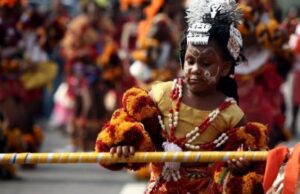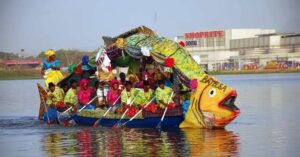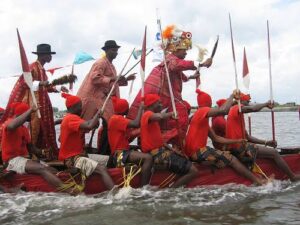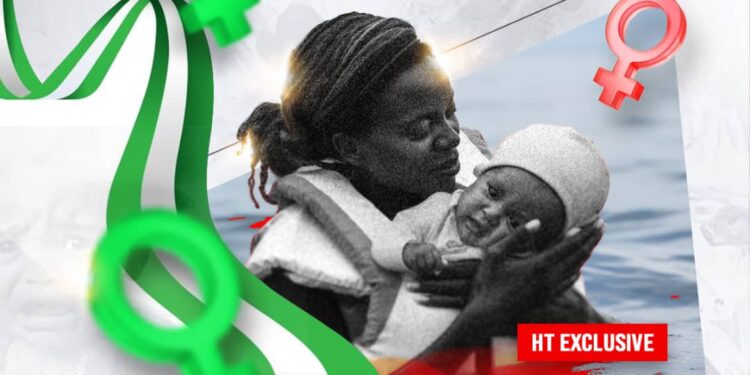By Emmanuel Nduka
If you are from the Ijaw ethnicity, a predominant kinfolk spread across Nigeria’s oil-rich Niger Delta region, every Nigerian imagines that you have supernatural abilities under water. But is this a sensationalized story or a true practice by the fourth largest ethnic group in Nigeria? Whenever this topic comes up for debate, opinions rein in.

Empirically, those arguing with the aboriginals whether or not the practice is existential, should be able to discern whether casting a newborn into a sea of water upon birth explains why they become good swimmers later in life, or whether they can mostly swim because they are surrounded by water, and willingly or not, just like walking, they must learn to swim to master their territory.
The Belief
@OpriteGKalabarigirl wrote on X: “I am Ijaw, I didn’t go through this and I can swim (not professionally, but I can save myself at least)”. While some Ijaws in the Diaspora told Heritage Times HT that the practice is real, but that they were not sure if it is still being upheld, some others (non-Ijaws) designated the practice as “semi-drowning” and “abuse” of the child.
“Those who live by the river practice it so that the child can swim. I’m not very sure, I merely heard about it,” Oyintari Ben, an Ijaw man living in the UK told HT. “Yes it’s true. I guess it’s still being practiced in the villages. Those of us born in the township did not experience it, but my dad was thrown in the river like that and he swims very well. We had pictures of him while growing up, inside water with only his head showing,” another Ijaw indigene who resides permanently in Nigeria’s capital city Abuja, told Heritage Times HT.

“In the olden days when a child is born, he or she is dipped into the river, or their faces are washed in the river. It is a belief that it makes the child remember home even when he or she travels far and wide. Marriages, celebrations, feasts etc, were done in front of the river, but today, such customs are not in vogue,” an Ijaw X user wrote recently when the conversation came up once more.
It Is True
Comrade Bedford Benjamin, Spokesperson of the Ijaw Youth Council (IYC) in a chat with Heritage Times HT, divulged that, “It is true to say that when they give birth, in a tender age, the river is the bathing point of every Ijaw child in those days. The same way every other child has its first bath in a normal bathroom, the Ijaw child has its first bath in a river. It is not that the child is thrown in the river to start swimming as rumored, the child is only dipped into the river for a while and brought out just to familiarize with the water. It is the bathing point of the child”.
Agnostic Myth
While the existential practice of the casting of newborns into a river by the Ijaws remains agnostic, some other school of thoughts have deemed it a myth with no factual basis. They have submitted that the myth may have likely originated from misinformation, cultural misunderstanding, malicious intent or exaggeration.
It’s All Tradition
The Ijaw people have a rich cultural heritage and traditions that do not involve harmful practices like infanticide or abandoning newborns in rivers. In fact, the Ijaw culture places a high value on children and family, and newborns are celebrated and cherished.

It is infeasible to separate an Ijaw man from water. Water is life to an Ijaw man. It can be concluded that casting newborns into water is something that has been practiced by the tribe’s forbearers to enable the newborn to connect with water and survive in it when the need arises.
Because of their attachment to rivers, the Ijaw cultural, social, economic and religious lives are largely defined and influenced by water. Water, it is said, has no enemy. There is a fond saying among the Ijaw elders that: “water is friendlier to the Ijaw people”.
Predominantly, the Ijaws have a deep historical and cultural connection to water. Their lives are intertwined with rivers, creeks, and the ocean, as these water bodies provide not only livelihoods through fishing and trade, but also cultural identity and spiritual significance.
Traditionally, Ijaws are skilled fishermen and boat builders, utilizing their expertise to navigate the intricate network of waterways in the region. They also engage in trade, using canoes to transport goods and connect with neighboring communities. Water is central to their economy, providing a source of food, transportation, and trade routes.
Beyond economic aspects, water holds profound cultural and spiritual importance for the Ijaws. Many of their myths, legends, and rituals are connected to rivers and water spirits. They believe in deities associated with water, whom they appease through ceremonies and offerings to ensure favorable fishing conditions and protection from natural disasters.
However, the relationship between the Ijaws and water has also been fraught with challenges due to environmental degradation, oil exploration, and conflicts over resource control. These issues have impacted their traditional way of life and heightened tensions with the Nigerian Government and multinational oil corporations operating in the region.
In summary, water is not only a vital resource but also a cultural symbol that shapes the identity and daily life of the Ijaw people, reflecting their resilience and ongoing struggle to preserve their heritage in a rapidly changing world.




































